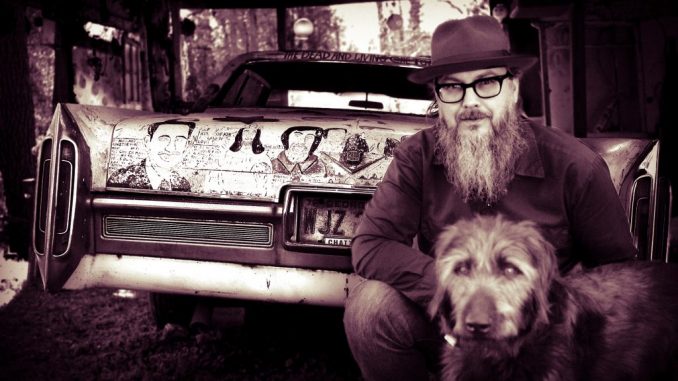
By choosing singer-songwriter Otis Gibbs for this series, I don’t mean to downplay his accomplishments in any way. He certainly has a large fan base all over the world, but considering the really fine albums he has created over the past two decades, plus his live shows, podcasts, and incredible work with other musicians, that base should be much larger.
Otis Gibbs grew up in Wanamaker, a small rural town in central Indiana just southwest of Indianapolis. His working class forebears had moved to the area from northern Kentucky a couple of generations earlier. Gibbs’ father and grandfather – Paul Otis Gibbs Sr. and Paul Otis Gibbs Jr. – and an uncle played music and introduced him to classic country and bluegrass: Bill Monroe, Loretta Lynn, and Hank Williams.
From the earliest days of his career, Gibbs was well-liked and respected by fellow musicians and music fans in Indianapolis and elsewhere in the Midwest and South. His reputation goes back to when he was playing in small neighbourhood bars and clubs like The Patio, but (like Austin Lucas) his career really took off when he started playing gigs overseas in the UK and Europe.
Gibbs won over fans with his personable shows and his way of addressing personal struggles as well as social and political issues (see ‘Grandpa Walked A Picket Line’). His songs, about regular working people with relatable lives and self-deprecating tales about his own experiences, are characterized by thought-provoking lyrics. Even when tackling a complicated social issue, unlike some of his peers, he isn’t condescending or overbearing. He draws inspiration from classic American folk music, country, roots, rock music, and probably from the Methodist hymns he heard in church as a kid in Wanamaker. There’s an unpolished authenticity to him that I love.
I always recommend his debut ’49th and Melancholy’ (2002) and ‘Souvenirs Of A Misspent Youth’ (2014) to people, as well as his most recent ‘Hoosier National’ (2020). He has self-released the vast majority of his work and maintained creative control over his output. Unlike the homogenized international culture where every plot of a movie, TV show, and song takes place in the same handful of places, Gibbs mentions non-famous neighbourhoods where he’s lived (‘Fountain Square’), local characters, and places he has travelled that are meaningful to him (‘Mount Renraw’). Even if listeners are not familiar with the places and people he sings about, and some of them are pretty obscure and unglamorous, the songs have universal appeal. I firmly believe that he deserves to be mentioned in the same breath as John Prine, Steve Earle, and Townes Van Zandt.
In addition to his music career, Otis Gibbs is an engaging host on his podcast ‘Thanks For Giving A Damn,’ where he interviews a wide range of people, including musicians, authors, and activists. His more recent YouTube channel/podcast – which should also be more well known – is an absolute treat, with front porch songs performed with his wife, musician and visual artist Amy Lashley, stories about music legends, interviews, and snippets of music history. You can see his grandpa’s ’64 Fender Jaguar guitar and hear about what exactly happened with Joe Hill’s ashes. Plus there are cameos by his adorable dog!


